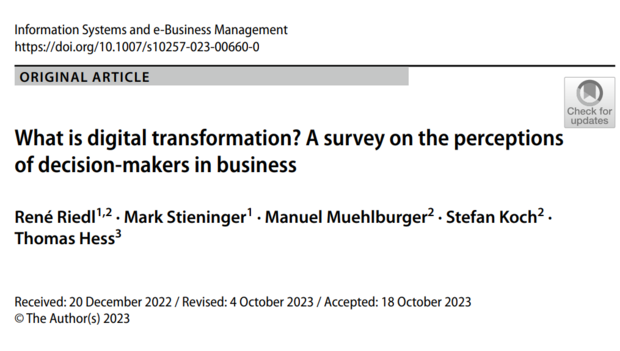
René Riedl (JKU / FH Steyr), Mark Stieninger (FH Steyr), Manuel Muehlburger, Stefan Koch (JKU Business School, Institute for Business Informatics - Information Engineering) and Thomas Hess (LMU München) investigate the perception of digital transformation in their currently published study "What is digital tansformation? A survey on the perceptions of decision-makers in business", opens an external URL in a new window.
In recent years, conceptual and theoretical work has dominated the discussions surrounding the phenomenon of digital transformation. This paper complements this discussion with an empirical look at the practical perception of the phenomenon. Based on survey data from 529 decision-makers, the study identifies key discrepancies between the current academic discourse and practical perceptions. The work thus makes a significant contribution to an improved understanding of the digital transformation in practice.
Abstract
In the past years we have observed enormous adoption and use of digital technologies in almost all domains of human life. In this context, researchers and practitioners have been using the term “digital transformation” (DT) to characterize phenomena related to the changes caused by increased use of digital technologies. The progression and contributions of corresponding discussions significantly depend on a common understanding and conceptualization of DT. Accordingly, the information systems research community has started working toward conceptual clarity. Importantly, the current debate focuses on theoretical contributions by academic researchers. Hence, data on the practitioners’ perspective on DT is missing. Against this background, we investigated general understandings of DT in practice. Our analysis comprises data of N = 529 business decision-makers in the UK. Our results show a significant discrepancy between science (i.e., conceptualizations and definitions of DT in the academic literature) and practice (i.e., business decision-makers’ perceptions and corresponding survey responses). Specifically, for a large proportion of the respondents their decision to classify concrete digitalization examples from the literature as DT or no DT was largely independent of the degree of organizational change caused by the use of digital technologies. This is a surprising result, as high-caliber academic literature proposes this degree to be a critical factor to characterize DT. Another key finding is that a remarkable number of practitioners consider a digitalization initiative as DT based on the mere occurrence of specific buzzwords related to digital technologies in the corresponding descriptions. In particular, the buzzword “digital technology” led the survey participants to classify a definition as instance for DT. We discuss implications of our results and limitations.








